
Paul Gauguin Christmas Night (The Blessing of the Oxen) , 1902-1903

Brilliant headline.
• One Industry Will Keep Holding North America Together (CNBC)
Texas-refined gasoline fuels Mexican cars. Natural gas from Canada helps heat the Midwest and cool California. Electricity flows over the northern and southern U.S. borders in both directions. The interconnections in the North American energy industry are huge and growing — and could grow even closer during the Trump administration unless it decides to alter the flow of a key U.S. export (and import) — at the border. The U.S., Canada and Mexico have intentionally worked to combine the advantages of their energy resources. President-elect Donald Trump has said he would renegotiate NAFTA between the U.S., Canada and Mexico. While the new administration seems to be very friendly to the energy sector, there are still questions about whether there could be changes that affect the intricate web of energy connections between the three countries.
“It’s not so simple to say we’re going to renegotiate the trade deals. We set up the system to create those inter-linkages. You just can’t overnight legislate or executive order that away. If you try to do that, it’s going to have negative economic impacts, not just for the economies on the border but for these specific industries, like energy,” said Scott Anderson, chief economist at Bank of the West. Trump’s selection of former Texas Gov. Rick Perry as energy secretary, is seen as a positive for the oil and gas industry. Perry has spoken favorably about North America as an energy power house, including Mexico and Canada. Perhaps one of the most surprising recent developments is the boom in U.S. natural gas that’s flowing across the southern border, and the ambitious plans by the Mexican government to build more pipelines to take U.S. natural gas throughout Mexico and as far as Mexico City.
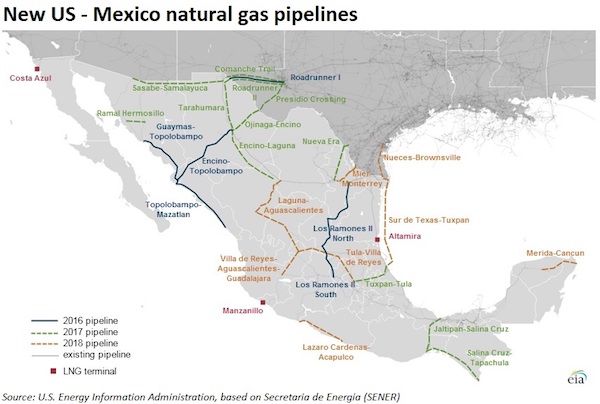
[..] The energy picture changed dramatically for North America in the last decade. The push by the U.S. energy industry into hydraulic fracking and horizontal drilling unleashed an energy boom, making the U.S. the world’s biggest producer of natural gas and placing it firmly among the top three oil producers. That has changed the situation for all of North America, at a time when Mexico’s oil and gas output was in decline and Canada found some of its potential oil output landlocked. The ties between the three countries go way back. In the early 1900s, the U.S. began sharing electricity with its neighbors, and Canada is now a significant net exporter of electricity to the U.S.
One catalyst has been Mexico’s program of energy reform, intended to break the hold of state-owned Pemex on its industry and bring new private investment to Mexico’s energy industry. The decline in big part was due to a lack of investment by the government in Petroleos Mexicanos, and its increasing reliance on Pemex revenue stream for its own budget. “Before shale, the U.S. was importing a lot more gas from Canada,” said Anthony Yuen, global energy analyst at Citigroup. The U.S. was also worried not that long ago that it would need to import LNG, liquefied natural gas. But the shale boom changed everything.
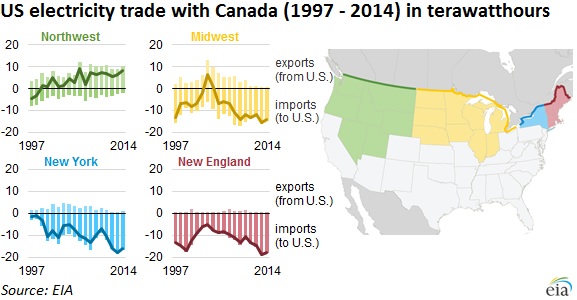

Fraud and shadow banking. Makes you wonder how pervasive this is. I have an idea.
• China Bank Calls Documents ‘Fake’ After Bond Default Linked To Alibaba (R.)
The fate of a defaulted $45 million Chinese corporate bond sold through an Alibaba-backed online wealth management platform was thrown into doubt on Monday, after a bank said letters of guarantee for the bonds were counterfeit. China Guangfa Bank said guarantee documents, official seals and personal seals presented by the insurer of the bonds “are all fake” and that it has reported the matter to the police. The dispute highlights challenges in China’s loosely regulated online finance industry, where retail investors often buy high-yielding bonds and other assets, expecting them to be “risk-free” due to guarantees provided by various parties. At the center of the latest dispute are 312 million yuan ($45 million) worth of high-yielding bonds issued by southern Chinese phone maker Cosun Group that defaulted this month.
The bonds were sold through Zhao Cai Bao, an online platform run by Ant Financial Services Group, the payment affiliate of e-commerce firm Alibaba. Ant Financial has asked Zheshang Property and Casualty Insurance, which wrote insurance on the bonds, to repay investors. On Sunday, Zheshang Insurance published two documents on its website that it said were from CGB carrying the bank’s official seals, and that guaranteed Zheshang Insurance policies for the Consun bonds. The letters were issued at CGB’s Huizhou branch in December 2014, when the Cosun bonds were sold, Zheshang Insurance said.On Monday, CGB said the documents were fake and that it had reported the incident to police as “suspected financial fraud.” The dispute follows instances of financial fraud this year including forged bond agreements that led to brokerage Sealand Securities sharing potential losses of up to $2.4 billion. In May, the government advised banks to be vigilant after several cases of bill fraud.

Well, yeah, that too.
• The Trump Rally Is Young (CNBC)
A trade war with China – a country with a $473 billion of bilateral trade with America in the first ten months of this year – is an implausible assumption. But a serious conversation about the fact that Chinese exports to America represent three-quarters of that business is long overdue and entirely appropriate. The President-elect Donald Trump is seeking a better deal for America. That should be easy to understand and support for any fair- and free-trader. And, rest assured, Washington’s intent to correct its huge trade imbalance with China is not coming as a surprise to Beijing. The Zhongnanhai mandarins know that their trade surpluses with the U.S. – $366 billion in 2015 and $289 billion in the first ten months of this year – are difficult issues that must be addressed. That is the substance of the problem.The rest is rhetoric.
Mr. Trump’s opening salvo used legitimate trade remedies,such as import tariffs, anti-dumping investigations, and possibly other measures if China was recognized as an exchange-rate manipulator. China has announced that it would respond with unspecified retaliatory measures, but President Xi Jinping talked about the need for Sino-American cooperation in his congratulatory phone call to Mr. Trump. The Chinese also liked the appointment of Iowa Governor Terry Branstad as an envoy to Beijing. They called him a “friend of China” and noted that he has known Mr.Xi since 1985. Difficult trade negotiating rounds are quite common. In this particular case, Washington also has the option of using non-confrontational measures to reduce the existing trade imbalance.
A change in the corporate taxation is one of them. That could bring back American manufacturing producing Chinese exports to the U.S. Some leaders of the U.S. Business Roundtable – a forum of 192 companies that account for most of investment activity in the United States – doubt that a large amount of that business can be quickly repatriated. They feel confident, however, that appropriate corporate tax cuts would keep firms producing and reinvesting their profits in the U.S. The corporate tax reform is at the top of Mr. Trump’s agenda, and that is perhaps one of the most effective trade signals he can send to China. Indeed, reducing the incentive for the exodus of American manufacturing, and bringing some of it back, would also stop large technology transfers that are part of mandatory Sino-American joint ventures for American firms doing business in China.

Lazy?
• What Is Productivity And Why Is The UK’s So Poor? (G.)
Productivity is a guide to how good a country is at delivering the goods and services that are bought and sold. Technically, it is the rate of output per unit of input, measured per worker or by the number of hours worked. In layman’s terms, it is a measure of what goes in and what comes out. In some sectors, productivity is easy to measure. A factory that makes 1,000 cars a day with 50 workers is twice as productive as a factory that requires 100 workers to do the same job. In other parts of the economy, assessing whether productivity has improved is harder and less objective. At face value a fast-food joint that employed the same number of chefs to cook the same number of hamburgers as they did a year earlier would not be showing any increase in productivity.
But if the quality of the hamburgers improved, that would be a productivity gain and statisticians would try to capture the improvement in the official figures. There are a number of ways in which a firm can make itself more productive. It can invest in new machinery that makes the production process more efficient. It can employ more highly skilled staff. It can train workers so that they can fully exploit the equipment they are using. It is through productivity improvements that living standards rise. For many years, the annual increase in productivity in the UK averaged around 2%, although there were periods when it was lower and periods when it was higher. Each year since the early 1990s, the Office for National Statistics has published an international comparison of productivity.
This showed that UK productivity was 9% lower than the average of the other six members of the G7 (the US, Japan, Germany, France, Italy and Canada) but this gap narrowed to 4% by the time of the 2007 financial crisis. Since then, however, productivity in the UK has barely grown and the gap with the rest of the G7 has widened to 18%. The gap with Germany is 35% and with the US 30%. There have been a number of explanations for the dramatic deterioration in productivity: the availability of unskilled cheap labour has deterred firms from investment; the poor quality of UK roads, railways and broadband network; the shrinkage of the financial sector, which had been a source of high-productivity jobs in the boom before the 2007 crisis; and the misallocation of capital to “zombie” firms kept alive by ultra-low interest rates rather than to dynamic new enterprises.

“Maybe the Americans [..] can use high tech trampolines to get into space and do without Russian technology.”
• What’s Behind Obama’s Attacks On Putin (Carley)
Relations between Russian president Vladimir Putin and US president Barack Obama are poisoned and irretrievably damaged. It’s therefore a good thing that Obama is leaving office on 20 January. Bad US-Russian relations are of course nothing new. Since the Anglo-American war against Iraq in 2003, the US-Russian relationship has been headed downhill. For Obama, it appears that everything has gotten personal. The US president often acts like a petulant adolescent, jealous of a high school rival. You know, the kid who does everything better than he does. The lad takes it badly and won’t let it go. He challenges his nemesis to some new contest at every opportunity only to lose again and again. That’s got to be hard on the ego. Between Obama and Putin there have been many such encounters. Nor can it help that western cartoonists so often ridicule Obama as out of his depth in comparison to Putin.
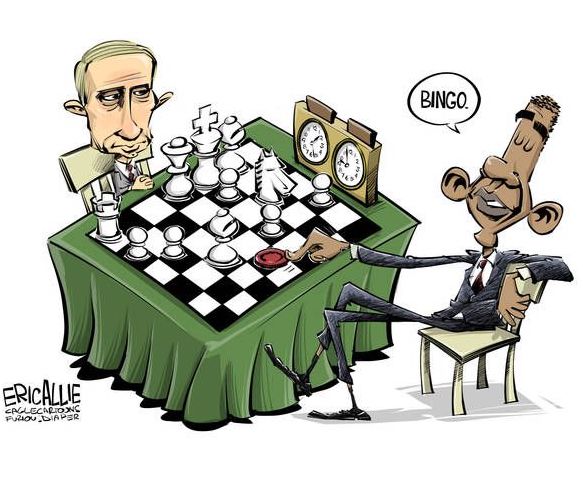
Let’s consider Obama’s remarks at his last press conference on Friday, 16 December. «The Russians can’t change us or significantly weaken us», said Obama: «They are a smaller country. They are a weaker country. Their economy doesn’t produce anything that anybody wants to buy, except oil and gas and arms. They don’t innovate». This was insulting both Putin and his country, but not enough apparently for Obama. «They [the Russians] can impact us if we lose track of who we are. They can impact us if we abandon our values. Mr. Putin can weaken us, just like he’s trying to weaken Europe, if we start buying into notions that it’s okay to intimidate the press, or lock up dissidents, or discriminate against people because of their faith or what they look like».
What on earth is Mr. Obama talking about? Intimidate the press? The Moscow newspapers and television media are loaded with «liberals». Many Russians call them «fifth columnists». They are «people with ‘more advanced’ worldview[s] who do not tolerate ‘Russian propaganda’ themselves», according to one colleague in Moscow. But Mr. Putin tolerates them and pays them no mind. «Lock up dissidents… discriminate against people»? What alternate reality does Mr. Obama live in? Doesn’t produce anything people want to buy? The United States buys rocket engines that it does not now produce at home. Maybe the Americans, a Russian commentator joked, can use high tech trampolines to get into space and do without Russian technology.
[..] You have to give credit to Obama; he was ambitious, aiming for a big prize and the humiliation of Russia and its president. Again, he was thwarted not so much by President Putin but by the Russian people of the Crimea who immediately mobilised their local self-defence units backed by «polite people», Russian marines stationed in Sevastopol, to kick out the Ukrainians with scarcely a shot fired. They organised a referendum to approve entry into the Russian Federation. Reunification was quickly approved by a huge majority and celebrated in Moscow. Putin gave a remarkably candid speech, explaining the Russian position. «NATO remains a military alliance,’ he said, «and we are against having a military alliance making itself at home right in our backyard or in our historic territory. I simply cannot imagine that we would travel to Sevastopol to visit NATO sailors. Of course, most of them are wonderful guys, but it would be better to have them come and visit us, be our guests, rather than the other way round».
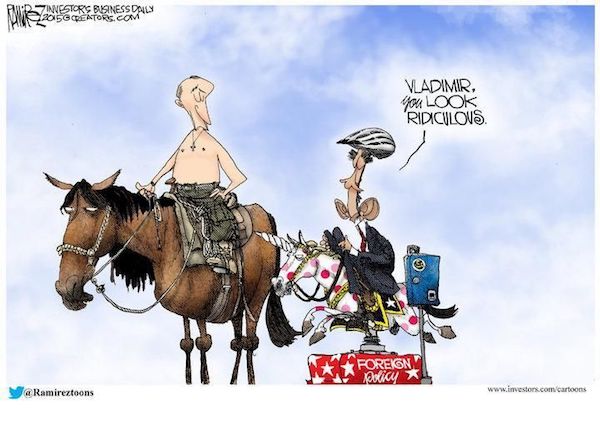

And why not?
• British Councils Admit Massive Use Of Spying Powers On Public (G.)
Councils were given permission to carry out more than 55,000 days of covert surveillance over five years, including spying on people walking dogs, feeding pigeons and fly-tipping, the Guardian can reveal. A mass freedom of information request has found 186 local authorities – two-thirds of the 283 that responded – used the government’s Regulation of Investigatory Powers Act (Ripa) to gather evidence via secret listening devices, cameras and private detectives. Among the detailed examples provided were Midlothian council using the powers to monitor dog barking and Allerdale borough council gathering evidence about who was guilty of feeding pigeons. Wolverhampton used covert surveillance to check on the sale of dangerous toys and car clocking; Slough to aid an investigation into an illegal puppy farm; and Westminster to crack down on the selling of fireworks to children.
Meanwhile, Lancaster city council used the act, in 2012, for “targeted dog fouling enforcement” in two hotspots over 11 days. A spokeswoman pointed out that the law had since changed and Ripa could only now be used if criminal activity was suspected. The permissions for tens of thousands of days were revealed in a huge freedom of information exercise, carried out by the Liberal Democrats. It found that councils then launched 2,800 separate surveillance operations lasting up to 90 days each. Critics of the spying legislation say the government said it would only be used when absolutely necessary to protect British people from extreme threats. Brian Paddick, the Lib Dem peer who represents the party on home affairs, said: “It is absurd that local authorities are using measures primarily intended for combating terrorism for issues as trivial as a dog barking or the sale of theatre tickets. Spying on the public should be a last resort not an everyday tool.”

Masters of destruction. Who think they’re creators.
• Humankind Has Created 30 Trillion Tons Of Stuff (F.)
Over the course of history, humans have made a lot of stuff — buildings, bottles, oil tankers, iPhones. Some of it is useful; a lot of it ends up being junk. It’s more than enough to leave behind a fossil legacy, were humanity to disappear. And as a species, our collection of stuff is only getting bigger. Researchers publishing in the peer-reviewed journal The Anthropocene Review now estimate that the sum material output of humankind exceeds 30 trillion tons. Spread evenly, that would amount to 110 lbs of human-made stuff for every square meter of Earth’s surface, as FORBES contributor Eric Mack pointed out. That’s a huge number. Here are some other, totally massive ways to conceive of our collective output: That’s about 16.8% of the weight of Mount Everest.
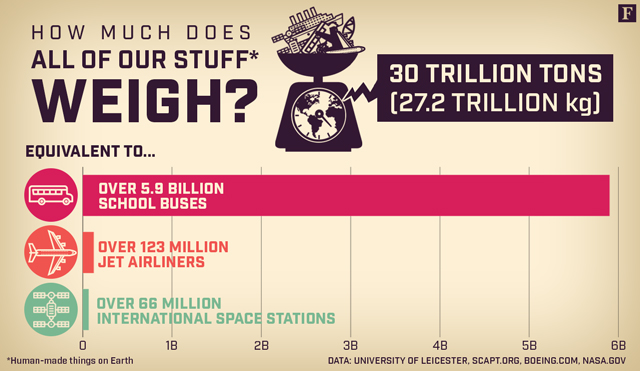
Now let’s visualize that number in terms of human-made things. It takes 5.9 billion Type D GVWR school buses at 10,000 lbs each to match all of humanity’s creations on Earth. If you’d prefer to view it in terms of larger objects such as Boeing 747-8 jet liners or International Space Stations, you’ll be looking at totals of 123 million and 66 million, respectively. If doomed cruise liners are your preferred unit of measurement, you would need over 647,ooo Titanics to come close to the immense weight of humanity’s creations. Increasing the size of your vessel to a 102-thousand ton Nimitz-class aircraft carrier, and you cut down the number of boats you’ll need to 293 thousand.
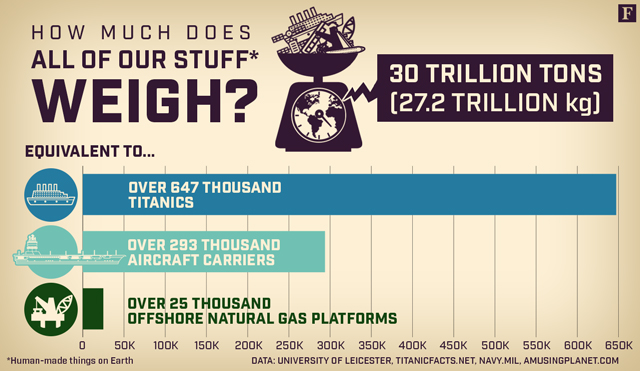

“Oh you’re in a hurry? Now we’re definitely not crossing the river.”
• Being Busy Is Not Cool (Awl)
Because I personally only understand the world through different types of animals, I’m going to use an animal analogy to describe what I think. Let’s say you’re leading a horse and a donkey toward a river. When you reach the little slope that dips down to the riverbank, both of them are gonna pause and be like, “Hey, is this a good idea?” Typically, with a horse, maybe you tug the rope a little and, even though he’s still skeptical, a lot of the time he’ll defer to your logic. “I must be missing something here, it must be safe if you’re saying it is.” He’ll walk down the bank to investigate. The donkey is the opposite. If he has stopped to assess a situation and you try to force his hand before he’s ready, he digs in even deeper. “Oh you’re in a hurry? Now we’re definitely not crossing the river.”
Convincing behavior can be a signal of emotional bias, which can be a signal of poor judgment. In other words, if you need me to cross this river so badly, you’re probably not thinking of my best interest too closely, so let me look over your work. And if you want to rush me along? Seems like a tally mark in the “scam” column tbh. Busyness is the river our culture is trying to get us to cross. To use another example, let’s say someone bursts into the office on Monday morning announcing that everyone has to see the new Star Wars movie because it’s amazing and they’ve never seen anything like it. I’d immediately assume, “This person doesn’t know what they’re talking about.” Why? Because I am a donkey. I know anyone who’s seen a movie that moved them emotionally or made them them think some new thoughts doesn’t automatically burst through a door like a manic sitcom character evangelizing everyone they encounter. That’s not how that feeling acts. And it’s the same with being busy: signifying is not the same as being.

“When we think of Italians or Irish, we don’t think of them as immigrants. They’re just people.”
• The Man Who Saved 200 Syrian Refugees (TL)
When Jim Estill decided to sponsor 50 Syrian refugee families, he didn’t tell anyone about it at first—not his accountant, not his friends, not even his wife. It was the summer of 2015, and the death toll in Syria had reached a quarter of a million people, while another four million had fled the country. All summer long, the news reported horror stories of Syrians drowning in the Mediterranean. Humanitarian aid programs were being cut across the Middle East. As he watched the news, Estill got worked up. “I didn’t want to be 80 years old and know that I did nothing during the greatest humanitarian crisis of my time,” he says. Estill was disturbed by the wave of xenophobia that had emerged during the Harper administration.
He wanted to demonstrate how refugees could help enrich our society. One of his best friends, Franz Hasenfratz, was a refugee who fled Communist Hungary. Hasenfratz went on to establish Linamar, a car-parts manufacturer, which is Guelph’s largest employer, with nearly 10,000 employees. “I was trying to drown out the xenophobes,” Estill says. “When we think of Italians or Irish, we don’t think of them as immigrants. They’re just people.” So he did some math. He checked Kijiji to find out how much apartments in Guelph were renting for, googled child tax benefits and GST/HST rebates in Ontario, and formulated a monthly food budget. He estimated that $30,000 could support a family of five for one year. He multiplied that number by 50 and realized the total cost—$1.5 million—was one he could easily afford.
[..] After Labour Day, Estill called a slew of local religious organizations—including three churches, a mosque, a Hindu temple and a synagogue—and aid agencies like the Salvation Army. On September 29, 10 civic leaders sat down in Estill’s boardroom at Danby. He’d made a PowerPoint presentation titled Refugees: The Right Thing to Do. Muhammed Sayyed, the president of the Muslim Society of Guelph, was amazed that so many faith groups were participating, even though most of the refugees would be Muslim. When he met Estill, he was filled with gratitude. “I thought, Wow, there are still people like him,” he said. An hour after the group sat down, the project was launched. The Muslim Society of Guelph would create the infrastructure, handle the paperwork and lead the volunteers. Estill would sustain the program with monthly donations. The group partnered with the Islamic Foundation of Toronto, which was a sponsorship agreement holder. This meant Estill could choose which refugees he wanted to sponsor.










